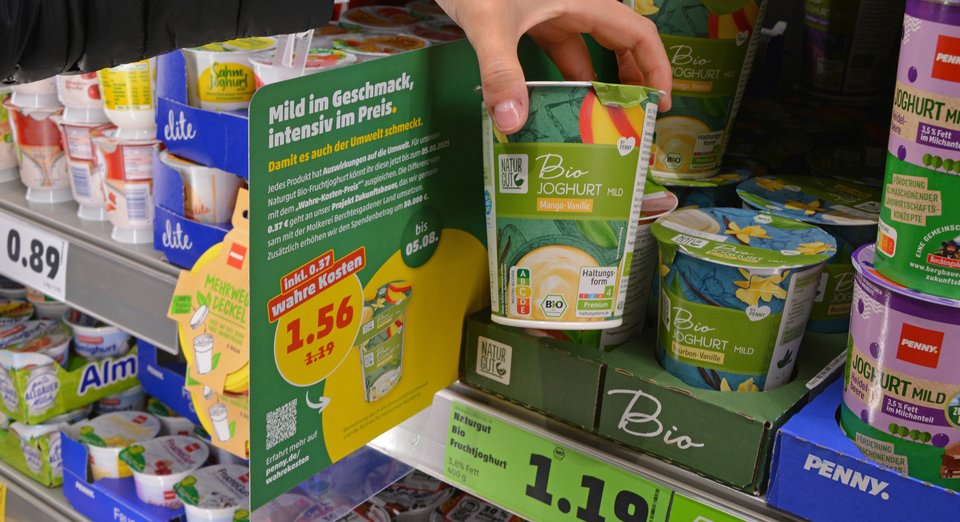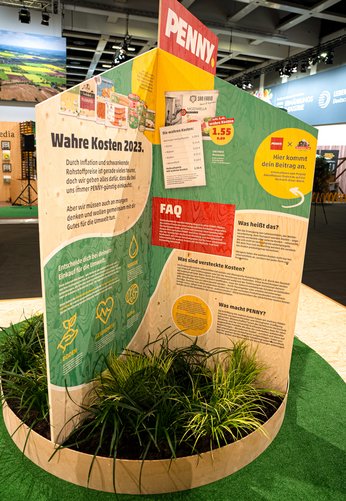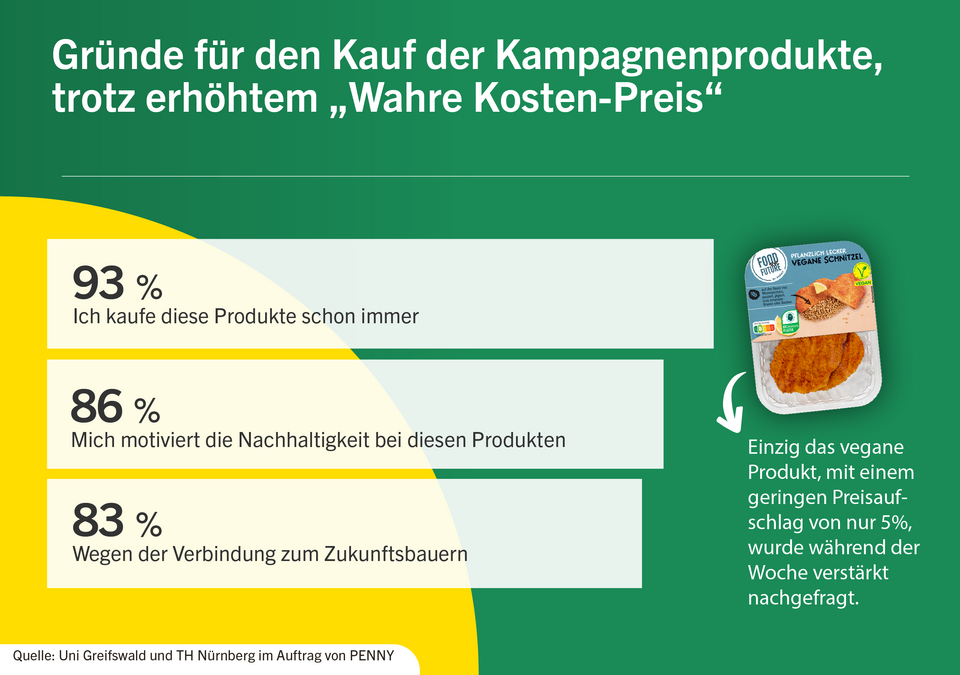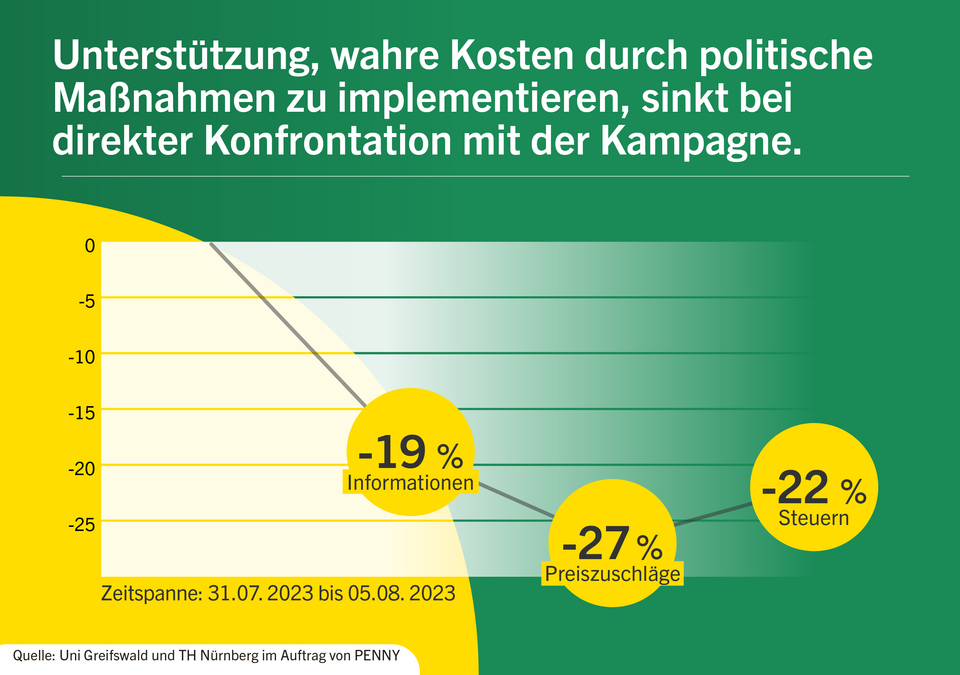
The University of Greifswald and Nuremberg Institute of Technology present the evaluation of the "True Costs" project. The aim of the project, to stimulate discussion, was achieved. PENNY donates the additional income of 375,000 euros generated from the campaign week to the Future Builders project.
From 31 July to 5 August 2023, PENNY sold nine selected products in all 2,150 stores in Germany at environmental impact costs calculated by the University of Greifswald and the Technical University of Nuremberg. The so-called "true costs" were shown separately and added to the current sales price. In addition, a total of 2,255 participants were surveyed before and after the campaign.
 Exhibition stand at the Green Week
In 2020, PENNY had already addressed "True Costs" for the first time in the general public as part of the opening of its sustainability experience store in Berlin. On 23 January this year, the researchers presented an initial assessment of the PENNY "True Costs 2023" project at the Green Week in Berlin.
Exhibition stand at the Green Week
In 2020, PENNY had already addressed "True Costs" for the first time in the general public as part of the opening of its sustainability experience store in Berlin. On 23 January this year, the researchers presented an initial assessment of the PENNY "True Costs 2023" project at the Green Week in Berlin.
Key project goals achieved
"I am delighted that our campaign week has succeeded in drawing broad attention to the topic of true costs and, together with the Nuremberg Institute of Technology and the University of Greifswald, has contributed to a scientific basis for the discussion," explains Stefan Görgens, COO PENNY, in the run-up to the publication of the results. One in three people consider the PENNY project to be suitable for initiating a political debate on the topic. "The success of the campaign confirms our resolve to continue our broad commitment to sustainability."
 Stefan Görgens, COO PENNY
Stefan Görgens, COO PENNY
Fact-based data enables a new quality of discussion
"There has never before been a study on such special price adjustments based on a comparably broad, fact-based database. This enables a completely new quality of discussion about environmental impact costs, also with regard to whether the food trade is the right place to address this issue. After the campaign week, customer estimates of the true costs have risen, both for products that were previously underestimated and for those that were overestimated. This shows that the respondents have realised that the true costs are higher than originally assumed. However, there is still no differentiation between products; further socially acceptable and low-threshold educational work is probably needed here to show which products are more sustainable than others. We think that 'true cost' price tags can contribute to this understanding," says Prof Dr Tobias Gaugler, Professor of Business Administration and Finance at Nuremberg Institute of Technology.
Attitude-behaviour gap between attitude and behaviour
Dr Amelie Michalke, sustainability scientist at the University of Greifswald, on the main findings: "In general, the greater the mark-up for environmental impact costs, the greater the drop in customer demand. 85 per cent stated that the main reason for not buying the products was the price. Customers make a slight distinction between products from organic and conventional production: although both show a downward trend, the decline in sales of organic products is consistently lower. As motivation to buy the products despite the high 'True Cost' price, buyers of the campaign products stated that they always bought them (93%), but also their interest in Sustainability (86%). In addition, respondents were convinced by the connection to Zukunftsbauern (83%). Only the vegan product, with a low price premium of just 5%, was in greater demand during the week.
Support for measures to implement true costs politically (via information, price surcharges or taxes) fell over the week (-19%, -27%, -22%) when consumers were actually confronted with true costs through the campaign." The fact that customers are acutely sensitised by the persistently high prices in almost all areas of life probably plays a role here.
Background to the 2023 campaign week
Every form of production and consumption has an impact on the environment. These currently invisible environmental impact costs - known as true costs - are inevitably incurred along the supply chains, but are not or only proportionately reflected in the selling price of products, services and food. Whether, when, how, where and by whom these are offset is not transparent. For selected conventionally and organically produced own-brand products as well as a vegan food, the scientists included the effects of soil, climate, water and health factors on the sales price via the supply chains in the true costs.
You can read more background information on the true costs in the opinion piece by Dr Amelie Michalke and Prof Dr Tobias Gaugler.
375.000 euros for the Future Builders project
 PENNY donated the additional campaign revenue of 325,000 euros - i.e. the difference between the sales price and the True Cost Price - plus a donation of 50,000 euros to Zukunftsbauer. This is a joint project between PENNY, the Berchtesgadener Land dairy, farmers and customers with the aim of contributing to climate protection and the preservation of family-run farms in the Alpine region. In return, PENNY waives part of its sales margin on all milk products from the Berchtesgadener Land dairy, and the dairy doubles the amount. This feeds into an annual funding pot of more than 350,000 euros, from which farmers of the cooperative dairy who want to optimise the energy efficiency of their farms receive funding of up to 10,000 euros. The Future Farmer was launched in October 2021.
PENNY donated the additional campaign revenue of 325,000 euros - i.e. the difference between the sales price and the True Cost Price - plus a donation of 50,000 euros to Zukunftsbauer. This is a joint project between PENNY, the Berchtesgadener Land dairy, farmers and customers with the aim of contributing to climate protection and the preservation of family-run farms in the Alpine region. In return, PENNY waives part of its sales margin on all milk products from the Berchtesgadener Land dairy, and the dairy doubles the amount. This feeds into an annual funding pot of more than 350,000 euros, from which farmers of the cooperative dairy who want to optimise the energy efficiency of their farms receive funding of up to 10,000 euros. The Future Farmer was launched in October 2021.



Both German and English comments appear here.
I always think it's a good campaign with the true costs. At the same time, I would hope that if the true costs of a product have already been found out on the basis of studies, this should also be permanently included in the price. But then no longer point it out so clearly, but sell it as a matter of course as "climate neutral". This would actually be a bold second step in the right direction, but I'm sure many other clever people with more expertise than me have already dealt with this question. Of course, this might lead to displeasure among some customers. At the same time, however, it could attract other customers who attach greater importance to the environment and climate.